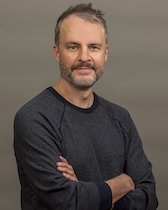Brannon Ingram
Associate Professor of Religious Studies

- brannon.ingram@northwestern.edu
- 847-467-4170
- Crowe Hall, 4-135, 1860 Campus Drive
Brannon D. Ingram is a specialist in Islamic studies. He works on Islam in South Asia and and global South Asian diasporas, with a particular interest in how Muslims have debated Sufism, Islamic law, and politics in the modern era. He received his B.A. in Religion from Reed College, his M.A. in Islamic Studies from Leiden University, and his Ph.D. in Religious Studies from the University of North Carolina at Chapel Hill.
Professor Ingram’s first book, Revival from Below: The Deoband Movement and Global Islam, was published by the University of California Press in 2018. The book examines the Deoband movement, a network of traditionally educated Muslim scholars (‘ulama) founded at the Dar al-‘Ulum Deoband seminary in north India. Since its origins in mid-nineteenth century India, the Deoband movement has become one of the most influential Muslim revivalist movements of the last two centuries. Focusing on the movement’s controversial critique of Sufism and how these critiques travelled to South Africa, Revival from Below is the first extensive study of the movement beyond South Asia and of its efforts to maintain the centrality of the ‘ulama in Muslim public life.
Ingram is currently working on a second book, examining how Muslims have theorized, debated and contested the category of ‘religion’. He is especially interested in the intellectual routes through which Western concepts of religion (largely, but never monolithically, ‘Protestant’) circulated in Muslim societies under colonialism, and how and why certain thinkers, scholars and activists, usually grouped under the rubric of ‘political Islam’, rejected the notion that the category of ‘religion’ correlated with din – the word, in Islamicate languages, most often taken to be religion’s equivalent.
Ingram’s research and teaching have been supported by the American Council of Learned Societies, the Social Science Research Council, the Andrew W. Mellon Foundation, among others. At Northwestern, he regularly teaches Introduction to Islam as well as courses on Sufism, Islamic Law, and the Qur’an. In 2018, he received the Weinberg College of Arts and Sciences Distinguished Teaching Award. With Elizabeth Shakman Hurd, he co-directs the Global Politics and Religion Research Group.
Selected Works
“The Queen’s Urdu: Translating Colonial Secularity in Victoria’s 1858 Proclamation,” Victorian Literature and Culture, special issue ed. by Miles Taylor and Siddharth Satpathy, 52, 1 (2024): 104-27.
“Two Deobandi Views on Being Muslim in India: Indian Bodies, Meccan Hearts,” in Chiara Formichi, ed. Routledge Handbook of Islam in Asia (London: Routledge, 2021), 310–22.
“Is Islam a ‘Religion’? Contesting Din-Religion Equivalence in Twentieth Century Islamist Discourse,” in Brannon Wheeler and Ilyse Morgenstein Fuerst, eds. Words of Experience: Translating Islam with Carl W. Ernst (Sheffield: Equinox, 2021), 19–40.
Revival from Below: The Deoband Movement and Global Islam (Oakland, CA: University of California Press, 2018).
“Crises of the Public in Muslim India: Critiquing ‘Custom’ at Aligarh and Deoband,” South Asia: Journal of South Asian Studies 38, 3 (2015): 403-18.
“What is a Public? Notes from South Asia,” (with J. Barton Scott), South Asia: Journal of South Asian Studies 38, 3 (2015): 357-70.
“Public Islam in Post-Apartheid South Africa: The Radio Islam Controversy,” Critical Research on Religion 3, 1 (2015): 72–85.
“The Portable Madrasa: Print, Publics and the Authority of the Deobandi ‘Ulama,” Modern Asian Studies 48, 4 (2014): 845–871.
“Sufis, Scholars and Scapegoats: Rashid Ahmad Gangohi and the Deobandi Critique of Sufism,” The Muslim World 99, 3 (2009): 478 – 501.
